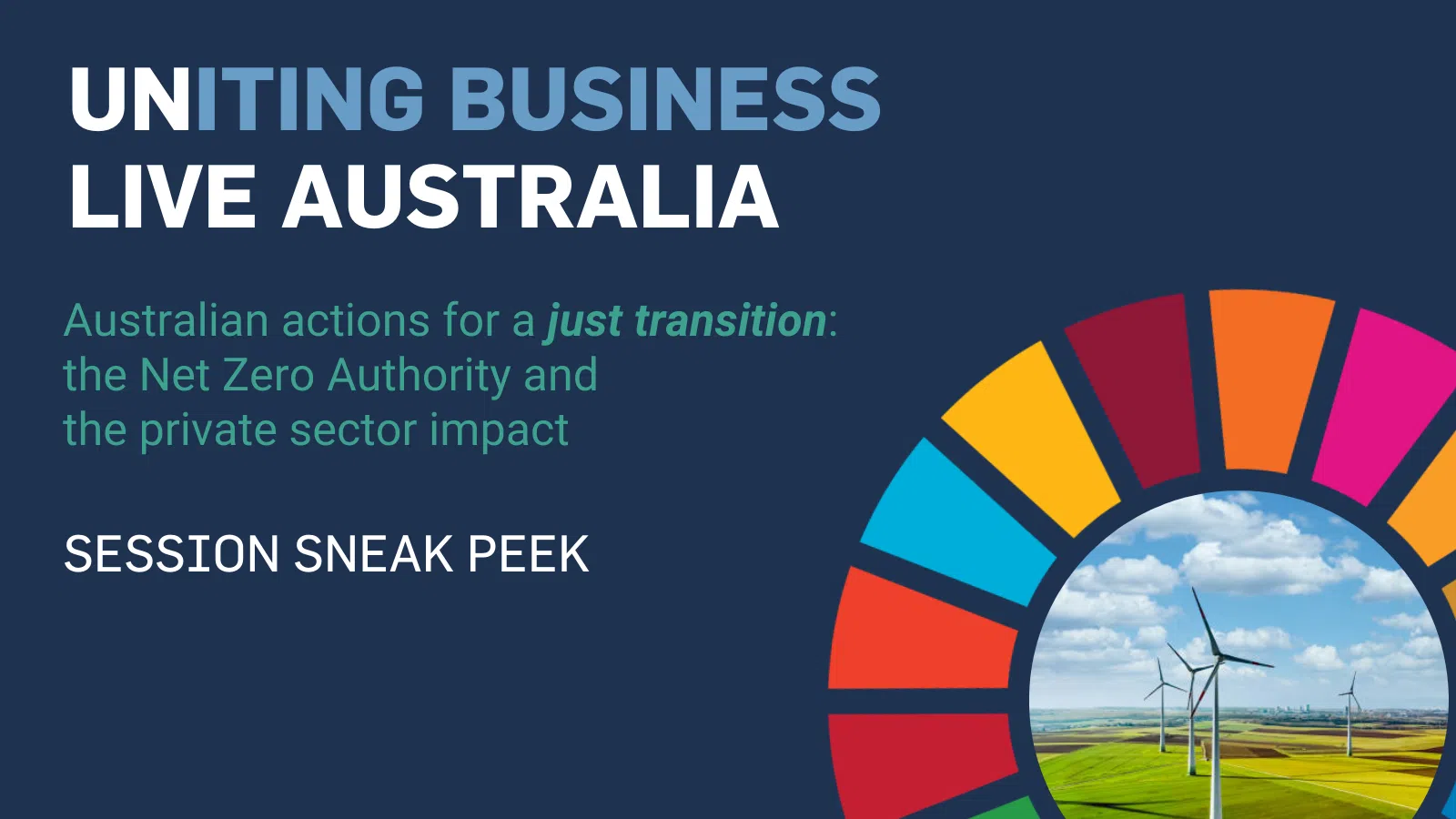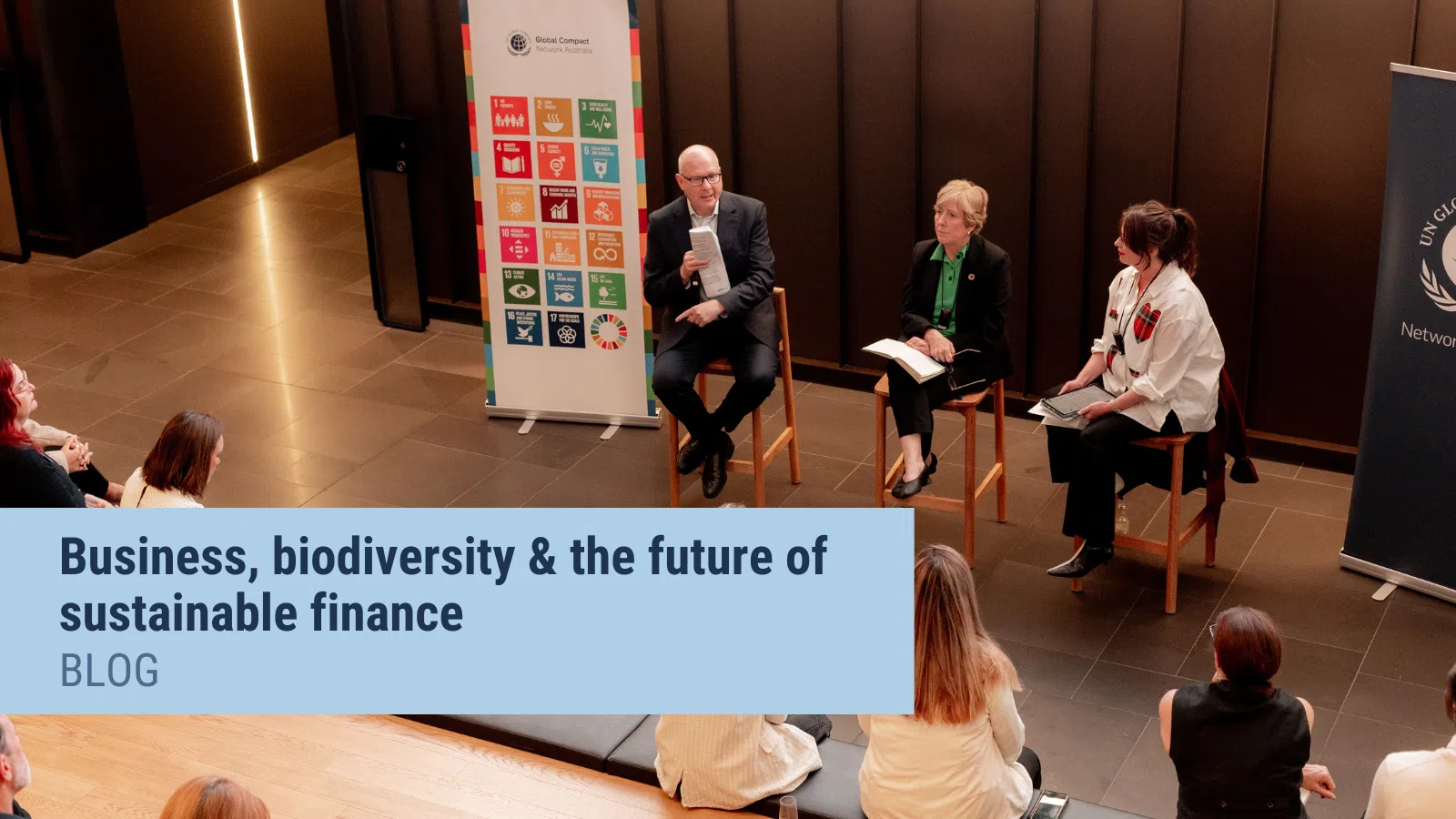
Blogs, Environment & Climate Change, Events
BLOG | Australian actions for a just transition: the Net Zero Authority and private sector impact
Dr Evan Center | August 21, 2024
In this blog, we explain how the Net Zero Authority relates to Australian businesses, the intersection between decarbonisation for business and social equity in a just transition and actions Australian businesses can take to address the rapidly shifting landscape of sustainability.
In line with the Paris Agreement, Australia’s goal to achieve net-zero emissions by 2050 has a massive impact on Australian businesses and communities, especially those that are currently most affected by the present implications of climate change. The Federal Government made this transition an increased priority with announcements for the support of clean energy practices and technologies, such as passing the Climate Change Act 2022 and being the first country to submit a Paris Agreement inventory.
Defining a Just Transition
As businesses and governments make the shift towards renewable energy, both globally and within Australia, they must work together to deliver a just transition for all impacted. A just transition refers to advancing decent work, promoting social inclusion, and eradicating poverty in the process of delivering a net zero economy by 2050.
Those most affected by the just transition include current climate-vulnerable communities. To support these communities, both government and private sector actors must work together to develop the skills necessary for green jobs, while also driving sustainability policies that support First Nations’ engagement and the empowerment of marginalised groups.
What is the Net Zero Authority and what does it mean for Australian businesses?
In 2023, the Albanese Government announced the legislation of the national Net Zero Authority to “ensure the workers, industries, and communities that have powered Australia for generations can seize the opportunities of Australia’s net-zero transformation”.
The legislated Net Zero Authority will:
- Support workers in emissions-intensive sectors to access new employment, skills, and support as the net-zero transformation continues
- Coordinate programs and policies across government to support regions and communities to attract and take advantage of new clean energy industries and set those industries up for success
- Help investors and companies to engage with net-zero transformation opportunities.
Australian businesses can leverage this new legislation and support a just transition by adapting policies and strategies that are based on social dialogue and stakeholder engagement.
Renewable Energy and a Just Transition
A just transition supports local, indigenous, and first-nations groups as businesses adjust operations in accordance with the Paris Agreement.
In alignment with the International Labour Organisation’s (ILO) guidelines, a just transition must take a people-centric approach and focus on the role of decent work (Sustainable Development Goal #8), which includes four pillars:
- full and productive employment
- rights at work
- social dialogue and
- social protection.
As outlined in the United Nations Global Compact report, Just Transition and Renewable Energy: A Business Brief, the shift from a fossil fuel-driven energy system to one based on renewable energy sources and technologies, significantly impacts and reshapes both national economies and local communities. Although there is great potential to generate numerous employment opportunities, promote sustainable growth, and enhance overall well-being, it is critical that already present inequities of climate change are neither perpetuated nor exacerbated.
Ultimately, industry and government must work together to account for misalignments – such as job losses in the fossil fuel industry – and provide training for the nuanced skills required for green jobs. By placing people’s needs at the core of the transition, Australia can address these challenges and ensure a fair and equitable transition for all.
First Nations and a Just Transition
First Nations communities are critical partners in the just transition. About 40% of Australia is covered by native title, in both exclusive and shared title. First Nations people have strong local and cultural knowledge, including management of Country, that is crucial in informing how Australia transforms its energy systems to achieve net-zero emissions.
The Australian Government has allocated $5.5 million to develop the First Nations Clean Energy Strategy, a key initiative under the National Energy Transformation Partnership. This strategy seeks to engage First Nations people and businesses by involving them in renewable energy policies and programs, identifying areas for improvement and guiding future investments. Through meaningful collaboration, the strategy aims to ensure that First Nations people, who face significant climate impacts and energy challenges, are key partners in Australia’s clean energy transformation.
The First Nations Clean Energy Network – a network comprising First Nations people, community organisations, land councils, unions, academics, and industry groups – advocates for expanding access to training, creating employment opportunities, and developing career pathways in clean energy as crucial elements in ensuring that the energy transition positively impacts the lives of First Nations Australians. Fostering long-term employment and skill development – with a focus on career building — is a fundamental approach to building generational wealth for First Nations Australians.
Actions for Just Transition Engagement
Businesses are critical drivers for the supply and demand of renewable energy. Likewise, they are instrumental in developing innovative approaches that ensure the most efficient use of energy resources and improve energy access. Therefore, businesses must respond to the urgency of a fair energy transition and set ambitious targets, formulate just transition plans, and publicly disclose progress.
To further your business’ actions towards a just transition, we invite you to join the Uniting Businesses LIVE Australia conference and annual dinner where sustainability specialists will discuss:
- how the National Net Zero Authority intends to operationalise its agenda and address labour challenges
- investment opportunities
- the impact the private sector plays on local and Indigenous communities and
- the history, connections, strategies, and collaborations between government and business that are essential to propel Australia towards a net zero future.
Prepare to be inspired by two sessions focusing on the topic of net zero:
- A keynote speech by The Hon Matt Kean, Chair of Climate Change Authority, explores the history, connections, strategies, and collaborations between government and business that are essential to propel us towards a net zero future.
- A panel discussion on the Net Zero Authority and private sector impact, which delves in a transformative era where corporates and investors play a crucial role in ensuring a fair and inclusive transition towards net zero. Featured speakers include:
- Deb Barwick, CEO, New South Wales Indigenous Chamber of Commerce
- Jessica Forrest, Executive, Sustainability, National Australia Bank
- Ruth Madden, ESG Manager, Port of Newcastle
- Sharan Burrow AC, Advisory Council, University of Melbourne Climate Futures; Visiting Professor in Practice, London School of Economics
*Authors: Farah Dirgantoro and Dr Evan B Center.
UNiting Business LIVE Australia is the defining sustainability event of the year, giving leaders the opportunity to shape the future of business in Australia.
In a watershed moment for corporate accountability, UNiting Business LIVE Australia conference and annual dinner will equip businesses to navigate ongoing socio-environmental and regulatory changes.
This event from the UN Global Compact Network Australia (UNGCNA), the Country Network of the world’s largest corporate sustainability initiative, presents insights from international sustainability leaders to solve the most pressing challenges faced by Australian organisations today.
Secure your delegate passes today: https://bit.ly/4cuq1AU


